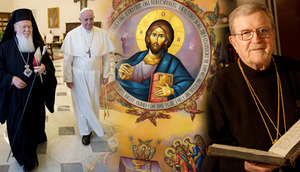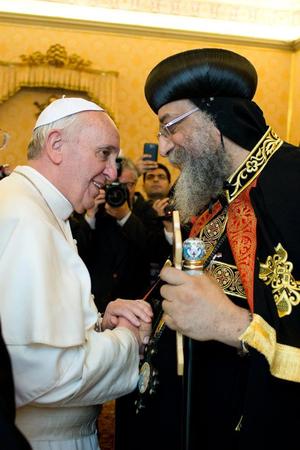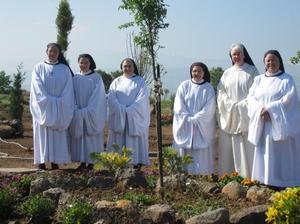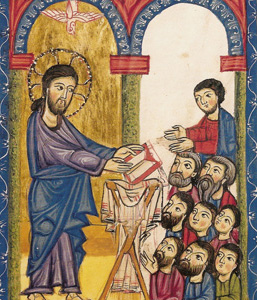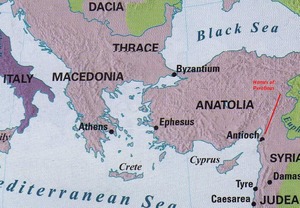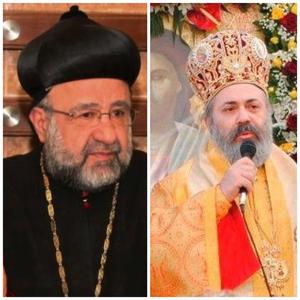We need witnesses. This is an idea that I am echoing from the teaching of Paul VI. Who are the witnesses that lead you to a deeper relationship with the Other, with friends, and with oneself?
Tag: Eastern Christians
Christians face being insipid
One of the things I like about Pope Francis is the common imagery used in his homilies. No long ago he warned of becoming a babysitter church. Today’s Mass at the Domus Sanctae Marthae with members of the Congregation for the Oriental Churches the Holy Father used the biblical –and common– metaphor of salt to speak about faith, hope and charity. Mark’s gospel for Mass today provides a good amount of grist for the mill. Salt helps to savor the faith as much as it opens taste buds to share this faith with others.
I think one of the reasons the Holy Father latched onto the use of the image of salt is basic encouragement of Eastern Christians to resist becoming “Museum-piece Christians.” So often the Eastern Christians are treated pretty poorly by Western Christians that it is too shameful to speak about; however, Eastern Christians also love the ghetto mentality. Isolation is a value for them, it seems. Frequently, you hear them complain and criticize the Roman Church for negligence when in reality they seem to prefer being someone’s door mat. If you read between the lines the Pope is giving a personal witness to Eastern Christians in living differently. Later in his homily, the Pope talks about Christianity’s originality. For me, I think the pope is criticizing those who want a uniform theological and liturgical tradition, which is not what it means to be Catholic. Francis, said,
“Salt makes sense when you [use] it in order to make things more tasty. I also consider that salt stored in the bottle, with moisture, loses strength and is rendered useless. The salt that we have received is to be given out, to be given away, [in order] to spice things up: otherwise, it becomes bland and useless. We must ask the Lord not to [let us] become Christians with flavor-less salt, with salt that stays closed in the bottle. Salt also has another special feature: when salt is used well, one does not notice the taste of salt. The savor of salt – it cannot be perceived! What one tastes is the flavor of the food: salt helps improve the flavor of the meal.“
Father Taft: we need a new ecclesiology –a startling revolution– Catholics are the no longer the only kids on the block
It is said that “The Eastern Churches have a special vocation in the contemporary world, which is both distinct from, and complementary to, that of the Western Church. Pope John Paul saw it thus, but he was not the only one. The language of the ‘two lungs’ of the Church suggests that the Church’s activity in the world is much diminished when one of the lungs is operating at a reduced capacity – which it certainly is if it is not fully being what it is meant to be.”
A vocation to serve the Churches, East and West, has been radically lived by a New England Province Jesuit priest, Robert F. Taft, for nearly a half-century. Christopher B. Warner published a terrific interview in the Catholic World Report, “Building Bridges Between Orthodox and Catholic Christians” is required reading to get a sense of the Church’s teaching and life.
Father Taft was a professor of mine, and he remains an inspiration and mentor.
Popes of Rome and Alexandria meet: Francis and Tawadros
A rare meeting between two Popes, that is, between the Patriarch of the West and the Patriarch of Alexandria happened earlier today in Rome when Pope Francis received Pope Tawadros of Alexandria, who heads the largest Christian Church in the Middle East. The first meeting between the two churches happened 40 years ago to the day with the Servant of God Pope Paul VI and Pope Shenouda III; at that meeting a Christological agreement was signed and a hope expressed to find a path to unity. Tawadros is on his first pilgrimage outside of Egypt since becoming the head of the Coptic Church in November. He is in Italy for 5 days.
Pope Tawadros proposed that 10 May each year should be marked as a day of celebration between the two churches. He also invited Francis to visit his Church, founded by Saint Mark the Evangelist around the middle of the First century.
Here is Pope Francis’ address:
For me it is a great joy and a truly graced moment to be able to receive all of you here, at the tomb of Saint Peter, as we recall that historic meeting forty years ago between our predecessors, Pope Paul VI and the late Pope Shenouda III, in an embrace of peace and fraternity, after centuries of mutual distrust. So it is with deep affection that I welcome Your Holiness and the distinguished members of your delegation, and I thank you for your words. Through you, I extend my cordial greetings in the Lord to the bishops, the clergy, the monks and the whole Coptic Orthodox Church.
Today’s visit strengthens the bonds of friendship and brotherhood that already exist between the See of Peter and the See of Mark, heir to an inestimable heritage of martyrs, theologians, holy monks and faithful disciples of Christ, who have borne witness to the Gospel from generation to generation, often in situations of great adversity.
Continue reading Popes of Rome and Alexandria meet: Francis and Tawadros
Clarence Gallagher, SJ, RIP
The Church mourns Father Clarence Gallagher, SJ, who died yesterday in England.
New Haven Orthodox Christians celebrate Pascha
The beauty and triumph of the Lord Jesus over death by His own death on the cross and subsequent resurrection from the dead is sadly celebrated by Christians on different dates. The divisions are scandalous. Western Christians had Easter on March 31, and Orthodox Christians will have their Easter, or Pascha, tonight. I hope, one day soon, all Christians can witness to the Lord’s resurrection on the same day. As Jesus said, ‘that they be one.”
Trappistine nuns in Syria
The mostly Italian group of Trappistine nuns forming a monastic colony in Syria are not moving, even in the face of violence.
Since 2005, Mother Marta Luisa Fagnani and the other nuns have committed themselves to prayer and work in a country in crisis. Their witness at the Monastery of Blessed Mary of Font of Peace (in Arabic, Dier al Adrha Yanbu’a-s-Salam), is a foundation of the Valserena Monastery in Guardistallo, Italy.
They write a blog, Ora pro Siria, in Italian and not frequently updated, but you can get a sense of their witness there. BUT, the monastic project of the nuns is explained here, which also asks the reader to help with prayer, friendship and money.
Yesterday, the daily Il Sussidiario published an English translation of an interview with one of the nuns.
Two years ago today, Traces magazine published a story, “The Sisters of Syria,” where the nuns talk about their call to make a monastic foundation in Syria, what freedom, the Encounter with the Lord and others and silence means. Few know, for example, that the Middle East had 11 monasteries of the Order of Cistercians of the Strict Observance (the Trappists) but dissolved due to the Islamic invasion. This is something to think and pray about. Do you have the same commitment to the Lord and to missionary zeal as these nuns?
What does it mean to be a priest?
How does the priest address the needs of the faithful today? Can the priest answer the questions being asked by the faithful and those seeking to know God,or at least willing to do the work needed to answer these questions? What type of witness needed today by the priest viz. the culture, media, and politics, so that we are happy, healthy and loving Christians? What are the concrete ways can we focus on God? How do Christians face nihilism with faith, hope and charity? What does it mean to be a person –and not merely an individual– realizing that the person is a part of a whole who glorifies God?
Why Christians need Antioch
These weeks we are hearing the narrative of the very early followers of The Way, that is, those who adhere to the Good News taught by Jesus, the crucified and risen one.
With the killing of the deacon while kidnapping the two bishops in Syria has me concerned about Christians losing the sensitivity to the importance of Syria as a key Christian center. Most Western Christians forget that our Christians origins in the West was first formed in the East. Recall from Acts that “it was in Antioch that the disciples were first called Christians.” It was in Antioch, not in Rome, not in Moscow, not in Constantinople, that the disciples of Jesus of Nazareth were first generated by the Holy Spirit, they were called by name. It’s not West OR East, but West AND East when comes to Christian faith. Does Antioch have any resonance with you Christians? Do you have any concern for our Christian heritage in Syria? What’s our concern for those being killed for being Christian today? Do we even care? Remember: God has created each of us to do Him some definite service; let us live and work in charity for our neighbor.
A famous Antiochian saint, the bishop Ignatius said this in his letter to the Magnesians, “It is right, therefore, that we not just be called Christians, but that we actually be Christians” (4.1).
Too often do I hear that it was much easier to be a Christian of the early years following the Ascension of the Lord and the Pentecost than today. That’s a crazy idea! First of all, no one who knows history can hold that idea as valid. Those who really and truly followed Jesus Christ as Lord and Savior, Messiah and Word made flesh, were harassed and/or killed. The Acts of the Apostles testifies to the fact that Jesus’ followers were killed. There is little difference with state of Christianity in AD 13 than in 2013. So what happened to the Christians in the 1st century is no different than what the dictatorship in Syria is doing now.
So, we can’t allow Syria to further unravel and act contrary to faith and reason. We need to remember that Antioch is crucial to our Christian identity today because our faith in the Lord is no less real, no less beautiful, no less controversial today than in previous eras. It is in Antioch (Syria) that we our Christian identity (belief, liturgy, church tradition, music, science and culture) was formed. Antioch (that is, Syria in general) and the people who live there is the place where and the community where we’ve learned the horizons of our Hope in what Jesus promised.
A preacher whom I like very much is the Very Reverend Denis Robinson, OSB, the president-rector of Saint Meinrad School of Theology. Dom Denis is a Benedictine monk and priest who teaches systematic theology. In 2007, he earned a doctorate in theology specially in the work of Blessed John Henry Newman from the Catholic University of Louvain, Belgium. Recently, he said,
As long as we keep stored up in ourselves the well-rehearsed scripts of indifference, ineptitude, pain, doubt, self-loathing. As long as we think we know the answers, after all that’s what mamma said, until we see that the world is more complicated than the truth we learned at our mother’s knee Brothers and sisters, there is one thing and one thing only that we need. We need Antioch. We need that identity. We need Antioch because we must learn to call ourselves something other than forsaken. We need Antioch. We need to learn to love rather than judge, to give rather than take, to provide for one another rather than constantly seeking the self, the damn self that will be truly damned if we cannot give ourselves over to Christ, all to Christ, fully to Christ, forever to Christ. Where will it be? Where will it be then? If not in Antioch, where will it be? Brothers and sisters we continue to revel in this Easter season knowing I hope full well that the complex completeness of Easter did not come on that solemn night of proclamation. Antioch beckons us in the name of towns and places as yet unseen, unknown, unexplored. And we respond full of hope that the fullness of Easter is still rushing in.
Kidnapping of two Syrian bishops
Doing humanitarian work, two bishops have been kidnapped by rebels Monday evening. Archbishop Paul is the brother Greek Orthodox Patriarch John. Here is the Vatican statement:
The kidnapping of the two Metropolitan bishops of Aleppo, Mar Gregorios Ibrahim of the Syriac Orthodox Church, and Paul Yazigi of the Greek Orthodox Church of Antioch, and the killing of their driver whilst they were carrying out a humanitarian mission, is a dramatic confirmation of the tragic situation in which the Syrian population and the Christian communities in Syria are living. The Holy Father has been informed of this recent, extremely grave act, which comes on top of the increasing violence of the past days and a humanitarian emergency of enormous proportions. Pope Francis is following the events with deep participation and he is praying for the health and the liberation of the two kidnapped bishops. He is also praying so that, with the support and prayers of all, the Syrian people may finally see tangible responses to the humanitarian drama and real hopes of peace and reconciliation rise on the horizon.
(Source: Vatican Radio)
Here’s an interview with Vatican Radio’s Linda Bordoni who spoke to Mario Giro, of the Community of St. Egidio about the kidnapping of the Syrian bishops. You may listen to the interview here.


